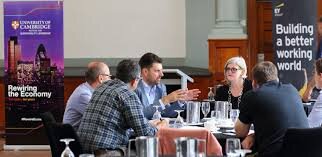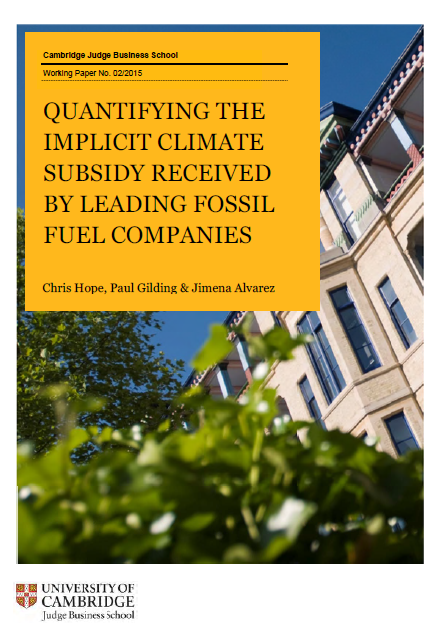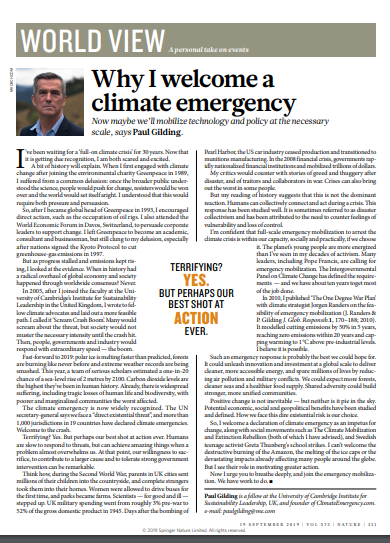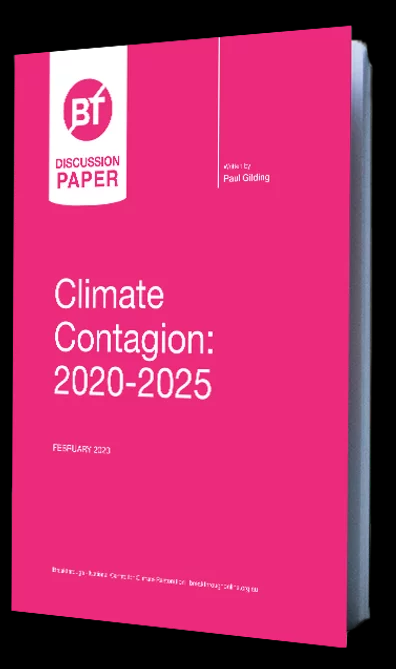
“..accepting the idea that the market they were driving, the machine they spent every day maintaining and expanding, was going to fail to deliver people out of poverty, destroy the global environment, wreck their children’s future, and in the process cost them their personal financial security was never going to be easy”.
| Paul Gilding 2008, The Great Disruption.
Academia
Research | Published Papers
I was invited to join the Cambridge Institute of Sustainability Leadership (CISL) Core Faculty in 2002. Letting a provocative, non- academic into the hallowed halls and allowing me to test and hone my thinking with such a powerful audience was a courageous move on their behalf, and testament to their dedication to innovation and disruptive thinking. For this I particularly acknowledge Dame Polly Courtice LVO who was the leader of CISL at the time and until 2021. Since then, particularly through the Prince of Wales’s Business & Sustainability Programme, (BSP) I have had the opportunity to teach on seminars, at the University of Cambridge and around the world, to senior business executives. I work with the BSP team to help them provide knowledge and techniques to corporate leaders seeking to address the global sustainability challenge within their organisations.
I am honoured to also be a founding director of the BSP programme here in Australia.
HRH The Prince of Wales Global Sustainability Fellowship Programme founding donors

“Thought-provoking, challenging and provides a real roadmap to understanding the issues as well as the solution”. - Chair, Global Infrastructure Practice, Arup Group Ltd.
“An extraordinary, well-structured and facilitated programme. A rollercoaster of emotions culminating in a clear plan on how to take this forward and make a difference”. - Head of Finance & Business Development, SABMiller.
“This seminar will evolve your perspective..” - Product Lead, Google Labs.
“This programme will unlock a deeper understanding of what leadership for sustainability can - and in fact - needs to be. It will empower you to lead towards change and contribute to your organisation’s sustainable future”. Sustainability Insights and Innovation Leader, Ikea Services
Globally, BSP has become a benchmark for sustainability leadership education and accumulated over 3,200 alumni from more than 1,500 organisations. Personally, I use the opportunity to challenge delegates to imagine what acceptance of the risk of collapse of the global economy and a resulting crisis response might mean for their organisations and the broader market. The insights I’ve gained on how the collective corporate mind works - and why change is so hard to achieve - has been invaluable.
As well my BSP work, I am a Fellow at CISL where my research and thought leadership focuses on ‘Radical Innovation – Accelerating Clean Disruption’, exploring our capacity to transform the global economy at sufficient speed and scale to address system wide sustainability risks, including keeping warming below the 1.5 degree target.
I also work actively with a research program we support financially : The Prince of Wales Global Sustainability Fellowship in Radical Innovation and Disruption. Dr. Pablo Salas has been appointed as the Prince of Wales Fellow to lead this work and you can see more on this below.
The purpose of these collective areas of activity is to develop greater academic rigour around radical and disruptive economic change. The reason I see this as so important is that I believe economic history shows that this level of economic change will primarily be delivered by new disruptive companies rather than the incumbent businesses. Therefore building the evidence base for this is key to facilitating and accelerating the change. Some of the writing that has resulted from my academic work is shown below.
Research

The Focus of my Research and Publishing
Sustainability is inherently a systemic issue and everything is connected. However to apply some academic rigour to research, there is a need to break the issues down to definable areas.
To explain my research and publishing focus , I use 3 themes to group my work into. Of course there is crossover across the themes in the research.
Radical Innovation and Disruption. This refers specifically to a collaborative academic research project at CISL, led by Dr Pablo Salas with our financial support, about how policy makers and others can understand and promote innovation as a more impactful catalyst for change.
Economic Disruption and the Climate Emergency. This is the focus of most of my research and publishing over the last 15 years where I have sought to define the inevitability of an emergency response to climate change and other limits to growth and why - and how - this will drive rapid, disruptive economic change and what that change could practically look like. This included the publication of my book The Great Disruption and various journal papers like the One Degree War Plan.
Food System Disruption. This is my emerging area of focus as I believe it is the next major economic impact after the transformation of energy which I argue is now unstoppable. I believe we are facing a disruption of the food and agricultural system that will be even more significant than the one underway now in energy and transport. It could also have enormously positive impacts on biodiversity and nature restoration.
Radical Innovation and Disruption
This ambitious research programme undertaken by Dr Pablo Salas in the Cambridge Institute for Sustainability Leadership, investigates the role of radical innovation and disruption to catalyse the transition to a sustainable economy using an interdisciplinary perspective. The project has three main objectives:
To provide an updated theoretical framework for the process of radical innovation and disruption, in the context of a dynamic policy environment
To identify the main gaps and opportunities to foster radical innovation in strategic technological and business sectors, and
Develop a strategy to facilitate radical innovations in key technological and business sectors. The project includes a co-productive framework of engagement with relevant stakeholders.
The likelihood of reaching the Paris Agreement targets will strongly depend on our capacity to innovate radically and disruptively in all aspects of society, including business models, industrial processes, policy and technology. Whilst radical innovation and disruption is a well-established field of study, dating all the way back to Joseph Schumpeter and his concept of ‘creative destruction’, as a discipline it has been mostly addressed from a business perspective. There is a gap between the current endorsed disruptive innovation theory and the actual impacts of the phenomena in markets, industries, and societies (Wilson, C. 2018) Aiming to address this gap, the ambitious research programme proposes to address the subject of radical innovation and disruption using an interdisciplinary perspective. The research project brings together contributions from the fields of complex theory, macroeconomics, dynamic systems and technology/engineering, to study the potential for radical innovation in technology, policy and business models to disruptively catalyse the transition to a sustainable economy.
Some of the specific areas covered by the research programme include:
Analysis of low-carbon innovation policy risks and opportunities (in contrast to cost and benefits).
Stranded assets and the financial risks of climate change
Disruptive innovation and competitive sustainability
Innovation and technology transfer as drivers of sustainable development
More information on this Cambridge Institute for Sustainability Leadership Research Project and Research Fellow Dr Pablo Salas can be found here.
Economic Disruption and the Climate Emergency
There has never been a point like this in all of human history. Our society and economy is now so large we have passed the limits of our planet’s capacity to support us (Steffen, W. et.al. 2015). Climate change is the definitive consequence of our behaviour, posing a time sensitive and existential risk. Global civilisation could unravel and enter a centuries long period of chaos. This is not a forecast but a material risk (Lenton, T. et.al. 2019). The science on this risk existing is now clear and accepted by any rational observer.
Yet we as a society have chosen not to respond at the speed and scale required to protect ourselves, despite the increasingly evident warning signs all around us. For the last few decades, my writing and research has explored why society has chosen delay over action, and the circumstances under which we may finally choose to act. Working on the premise that we as a species are ‘slow, but not stupid’, my research indicates that, while not certain, on balance it is most likely we will change. It is a clear pattern, from personal health to pandemics, to global calamities like WWII, that we deny, delay and avoid - then mobilise at extraordinary speed and scale. However because we tend to leave change until ‘the last minute‘ the economic consequences in this case will very much be a ‘great disruption’ and will involved a large degree of chaos, instability and inefficiency. While it will therefore result in huge global destruction of economic value, the resulting transformation will also create equally significant value, opportunity and potentially greater and deeper human prosperity.
The focus of my work falls broadly into the following sub-areas, with the over arching objective of helping society understand what is coming and how to accelerate the transition.
Key sub-themes:
The Great Disruption - A Rapid Economic Transformation Driven by the Risk of System Collapse
Mounting evidence of the risk of system collapse (ecological, social, geopolitical and economic) is triggering an economic tipping point. This is because it is becoming more widely accepted that we are up against time bound needs that can only be addressed through radical innovation in technology and business models – inevitably resulting in disruptive change across the market (Sharpe, S and Lenton, T. 2021). This will trigger disruption and transformation within many industries with technology, finance and policy working as a distributed system to favour investments and institutions that actively reduce the system risks. The foundation of this argument is presented in my book The Great Disruption that climate change is a symptom of the broader issue of the physical limits to our model of economic growth.
Incumbents v Disruptors - Who Wins Who Loses?
As described above regarding the CISL Research: “Whilst radical innovation and disruption is a well-established field of study, dating all the way back to Joseph Schumpeter and his concept of ‘creative destruction’, as a discipline it has been mostly addressed from a business perspective.” What this means is that investors and business leaders are well aware of the issue and the risks disruption poses to existing companies (Volberda, H. et.al. 2018). However what is missing - and is the focus of my research and writing - is an understanding of the implications for the system as a whole - including investors and managers but also policy makers, activists, technology developers and so on. This is an important question as, while the transformation is in my view inevitable, knowing how to accelerate change and how to best manage the resulting social disruption - and the role in both of these of policy and other system influencers like NGOs - is heavily influenced by what I think are incorrect assumptions about the ability of incumbents to transform (Alova, G. 2020). This is based on clear economic evidence of other historical disruptions driven by technology and other factors.
Quantifying the implicit climate subsidy received by leading fossil fuel companies | COVID19 & the Death of Market Fundamentalism | 2020: When The Great Disruption Began | Why Incumbents Fail | Disruptive Markets
Defining and Planning for the Climate Emergency: As a result of decades on inaction, climate change is now an emergency. In other words, the scale, timing and urgency of the risks justifies a full scale global emergency response. The evidence from countless experts, is that an emergency response is necessary, affordable, feasible and in fact the only rational response to the threat we face (Ripple, W. et.al. 2020). Due to having left action so late, such an emergency response will inevitably be rapid and economically brutal, akin to a full scale war like mobilisation. The speed and scale of the economic mobilisation during WWII provides valuable insights into what such an emergency response might look like. Given the scale of the existential risks we face, this approach could quite reasonably be seen as a mobilisation to save the economy and civilisation. The focus of my work here is on defining what an emergency response would actually entail and using historical evidence to explain that it is quite realistic to expect this response could both happen and it can most likely deliver a safe climate.
The One Degree War Plan | Climate Emergency Defined | War: What Is It Good For?
Geopolitics, Security and the Climate Emergency: The geo-political and security impacts of climate change - both physical climate change and the economic transformation it will trigger - has perhaps been the area of impacts most lacking in attention and analysis given its significance. However professionals within the military and the security establishment are increasingly now objectively analysing climate risks and threats, and rapidly sharpening their focus. They recognise that climate change and other ecological and resource constraints could be the defining threat to global stability in the twenty-first century. There is also increasing attention to the varied security impacts, both positive and negative, of the end of fossil fuels. Imagine for example the Middle East losing all of its all income. The focus of my work is to draw attention to the scale of the impacts and to promote deeper analysis by the relevant experts.
The Mother of All Conflicts | University of Oregon Cressman Lecture
Food System Disruption
Our society is facing existential risks from the integrated threats of climate change, ecosystem collapse, rising inequality, unsustainable resource use and a rapidly increasing population. Agriculture and our overall food system is one of the most at risk but also a key driver of these threats - yet also provides the crucial foundation for our society. It feeds us, clothes us and employs us, thus underpinning our stability and being the prerequisite for all progress. It has played a crucial role in human evolution and continues to frame cultures across the world. Its interdependency with human and natural systems however, makes it both vulnerable to and a contributor to, these integrated threats. Increased average temperatures, droughts, increased rainfall, bushfires, pests and disease and a rapidly increasing global population put the world’s food system at serious risk. Given this occurs in the context of inequality both within and between countries, the potential for a series of global food crises to be the trigger for global collapse is a high risk possibility (Cottrell, R. et.al. 2019).
This is not just an external threat to the food system - such as climate change impacts on the agriculture. The food system itself is driving the threat. Land clearing, competition for land use, water extraction and usage, the prevalence of monocultures, the use of pesticides and fertilisers, nutrient depletion in soils, raising salinity and greenhouse emissions from livestock and food processing all exacerbate the key risks to our society (Rockström, J. et.al. 2009).
Given all this context, the agricultural system that has served us so well for around 12,000 years is no longer sustainable in its current form. The sustainability of our food system is not a “nice to have”. As I’ve argued in my work on geopolitics, if we get this wrong it could be the trigger for a global unravelling of civilisation.
There is limited time for the system to evolve so a revolution is required. Rapid change is possible – we have seen this happen in the last decade with energy. And because change is essential, agriculture, and in particular the way we create and access food is arguably the next great economic disruption. Therefore the disruption of the food system and the implication for the economy is the focus of my current personal research.
My key interest is the rise of a series of new technologies and processes that could be the foundation of a genuinely renewable food system. These are not long term potentials but disruptive impacts that already underway. Some argue that the impacts of this disruption are revolutionary, and that just two developments - the production of protein through fermentation and cultured cells - will drive major disruption in our markets, particularly the meat and dairy industries, starting as soon as 2025. They argue the US cow population could fall 50% by 2030 with these ‘alternative’ proteins becoming 10x cheaper than today’s animal proteins by 2035. If trends prove these forecasts to be accurate, it will trigger investment that will transform the production process for many other food and nutritional ingredients (Tubb, C and Seba, T, 2019) (A.T Kearney. 2019). Others argue the disruption is not this imminent and it will instead be an evolution over many decades, with many false starts and unpredictable outcomes.
The Key Question : Is Revolutionary Change Possible?
We can learn a great deal by looking at the directly comparable example of energy. A transformation of the global energy system is now underway as it moves to ‘alternative’ clean and distributed energy and transport. It is a transformation of breath-taking scale given fossil fuels’ historical dominance of the global economy. What were some of the world’s largest and most powerful companies, are now in terminal decline in both market size and political influence. It is a reminder that sustainability - while often positioned as ethics and responsibility - can drive global market transformation and that means disruption and opportunity. The world’s richest person, Elon Musk, saw this coming when he formed Tesla.
The energy transformation was inevitable, driven by the necessity of action on climate change but delivered by technology, innovation, entrepreneurship and policy - or in other words, by markets responding to signals.
Two things are required to make rapid and disruptive transformation happen. The need for change has to be strong and the capacity to deliver the change has to be present. The need for change in the global food system is clear. It is not possible for the current model to grow due to physical limits like the climate, water and soil. Yet food supply must grow – indeed food is even more crucial to the global economy than energy. So, it will change. But when?
The need for change in the global energy system was strong and clear for many decades. In the last decade however, the technology to deliver this change became market ready. This is the point we are now approaching on food and agriculture. The technology to deliver the change has arrived and improvements in cost, scalability and demand are well underway, catalysed by rapid growth in investment.
The comparison to alternative energy continues. Solar, and especially wind energy, are not particularly new. Nor did the core technologies change dramatically in the last few decades. What happened was that enabling technologies - semiconductor and cell design, computing power, software, the internet, batteries and materials – did see dramatic change and this made solar and wind competitive, which then brought scale and slashed costs.
Likewise, the coming revolution in food and agriculture is largely not ‘new’ technologies, but ‘enabling’ technologies that allow us to do things we’ve been doing for centuries - smarter, faster and better. These technologies are leveraging big data, digital capacity and biotechnology then applying them to micro-organisms and animal cells. This will drive transformational market and social changes to food production and agriculture. As these enabling technologies following a ‘Moores Law’ like process of acceleration, we can reasonably assume the pace of change will in the end surprise us.
This whole area of food system disruption will be the focus of my research and publishing for the coming years. I believe that, with fossil fuels now in terminal and accelerating decline, food is the next horizon in action on climate change and will likely be the determining factor in our capacity to stabilise global civilisation.








